Ready Player One: The Progressive Gaming Narrative That Could Have Been
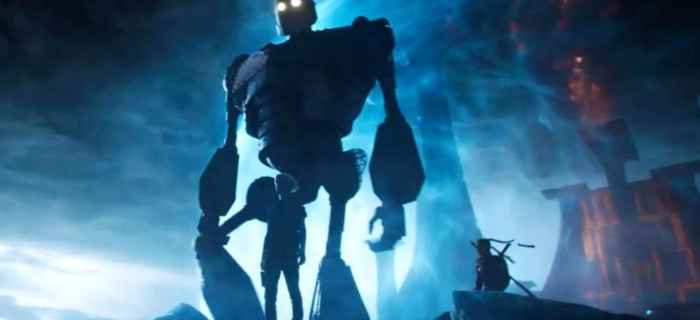
Video games are designed to provide validation to players. In the West, this is most often aimed towards the white, male, heterosexual audience, creating a narrative of success and wish fulfillment. In Ernest Cline’s Ready Player One, this formula still operates when players of the OASIS compete in a treasure hunt for the Easter egg of the late James Halliday, the OASIS’s creator, to win the inheritance of his multi-billion dollar estate. The OASIS is a MMORPG that has developed into a virtual reality society which allows users to escape their post-apocalyptic reality. “Gunters,” gamers who dedicate themselves to looking for the Easter egg, and the corrupt Innovative Online Industries (IOI) battle to win the contest and therefore control of the game. The narrative of the novel is presented in the first person perspective of Gunter Wade Watts, controlling his avatar Parzival, placing the reader as the spectator of Parzival’s video game campaign.
Parzival is the first Gunter to complete a stage in the hunt and becomes famous as the initial leader. However, competing against Parzival are the four other top Gunters who, with Parzival, form the “High Five”. OASIS users Art3mis, Aech, Daito, and Shoto all serve as formidable opponents, at times completing stages of the contest before Parzival and outsmarting him on a number of occasions. Nonetheless, with Wade as the white male heterosexual protagonist, Ready Player One still offers the wish fulfillment narrative present in so many Western video games since Parzival is the sole hero capable of saving the OASIS.
How then does Ready Player One ultimately undermine its own explicit narrative of diverse gamers around the world uniting against a common enemy in equality and finding friendship through their mutual love of media? Ultimately, it is the novel’s inheritance of gaming’s supremacy of its protagonist over all other considerations which subverts its otherwise progressive narrative.
Winner Takes All: Considerations of Gender, Sexuality, and Race
Considerations of gender, sexuality, and race must be taken into account when considering the High Five and how Parzival, the plot, and the video game elements of the novel interact with them. Parzival explicitly states that gender, race, and sexuality are not significant to how he considers his friends, but implicitly these characteristics do seem to affect how the High Five is treated.
The Sidelining of Daito and Shoto
Numbers four and five of the High Five, a duo of Japanese OASIS users Daito and Shoto, are originally reluctant to befriend the other leaders including Parzival, but eventually Parzival does befriend them through a mutual interest in Japanese media. Ultimately, this friendship is founded upon cooperation and balance; however, the plot of the novel soon sidelines Daito and Shoto thus subsuming them under Parzival.
Parzival invites Daito and Shoto to help him complete a hidden high-level Japanese-language quest based on the Ultraman TV series because he wanted to “extend some sort of olive branch” to them (204). Thus, the love of the same media serves as the link between Parzival and the duo and they are able to form a friendship that crosses borders. Further, their successful completion of the quest is based on mutual contribution and reliance, Parzival finding the quest through his attention to detail and ability to connect the quest to Halliday and Daito and Shoto translating the quest. Ultimately, this relationship is one of equal power.
Upon completion of the quest, the group receives the Beta Capsule, a rare game Artifact that temporarily grants the user the powers of Ultraman. Daito and Shoto originally argue over who should get to keep the Beta Capsule, Daito arguing that they should keep it while Shoto insists that it should go to Parzival, but Parzival refuses Shoto’s offer, claiming “Urutoraman is Japan’s greatest superhero. His powers belong in Japanese hands” (205). Parzival respects Daito, Shoto, and Japanese media, referring to Ultraman as Urutoraman, opting not to use the anglicized name of the hero. He further insists on Japanese powers staying in Japanese hands, knowing how much the Artifact would mean to Daito and Shoto. Here, Parzival ultimately puts the considerations of his friends above himself.
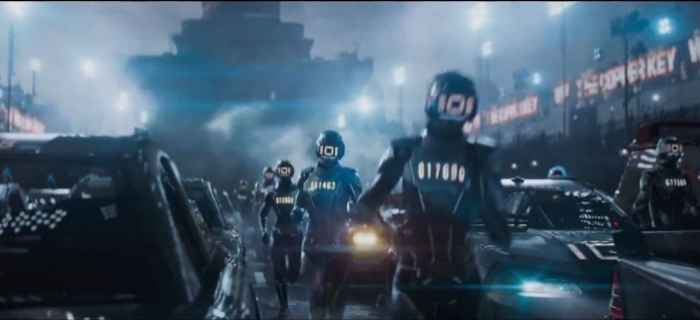
However, while Parzival seeks to empower and respect Daito and Shoto, the novel at large does not. Daito is killed by IOI when he uses the Beta Capsule against them in the game and in order to defeat him, IOI agents murder him in real life. Therefore, Parzival may not shift the power relations between him and Daito, but the novel ultimately uses him as a plot device to spark a plot for revenge in Shoto. Shoto vows to kill Nolan Sorrento, the CEO of IOI, in the game to avenge Daito; however, this only leads to his avatar being killed by Sorrento. This ultimately leaves Parzival to finish him off and gets Shoto killed before he can go with Parzival, Aech, and Art3mis to the final challenge of the hunt. While Parzival is not to blame for their sidelining, Daito and Shoto are diminished in importance by the plot itself.
Aech: Left Behind and Undermined
OASIS user Aech, number three of the High Five whose real name is Helen Harris, is similarly sidelined. When Parzival attempts to start a relationship with Art3mis, his close relationship with Aech suffers, admitting that they had “grown apart, and I knew it was my fault” (203). Parzival mostly breaks contact with Aech when he begins to date Art3mis and he only begins to really try to connect with her again when Art3mis tells him they should stop seeing each other. Ultimately, Parzival’s desire to be with Art3mis, which he self-describes as an “obsession” (178), overcomes all other aspects of his life and Aech is negatively affected by his selfishness. While Wade and Helen later reconcile, this incident on Wade’s part demonstrates his willingness to put aside his friends in the fulfillment of his own desires.
Further, Helen’s identity, as a black lesbian, is only revealed to Wade near the end of the novel when they meet in real life. He had originally thought she was a white male like her avatar, because “she followed her mother’s advice and created a Caucasian male avatar” (320). The OASIS allows Helen to experience the privilege of a white, seemingly heterosexual, male and she worries how Wade will react when he meets her in real life. Parzival appears to accept her, telling the reader that he “loved her as a dear friend. None of that had changed or could be changed by anything as inconsequential as her gender, or skin colour, or sexual orientation” (321).
However, when Wade next refers to Helen in the game he tells the reader that “even though I now knew Aech was actually a female in real life, her avatar was still male, so I decided to continue to refer to him as such” (330). The game in this instance does not serve as a place of freedom for Helen, but a trap. Parzival refers to her as her in-game facade even when he is only thinking about her and there would be no risk of revealing her identity against her will. While Parzival does not intend to misgender his friend and does always refer to as female when talking to her in real life, he does trap her as male in his narrative and therefore controls how the reader is supposed to approach her.
How Art3mis’s Aspirations are Buried Under the Love Story
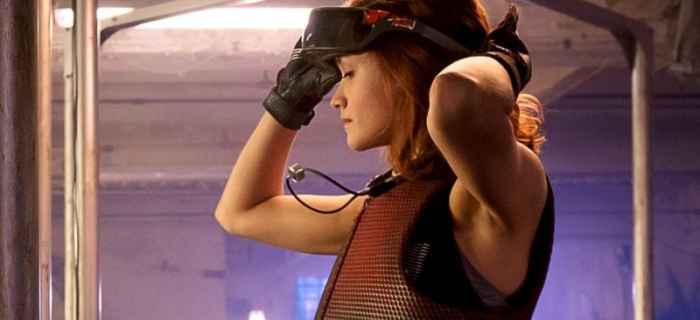
OASIS user Art3mis, whose real name is Samantha Cook, is Parzival’s most prominent competitor as number two of the High Five. Art3mis repeatedly demonstrates that she is at least as skilled a Gunter as Parzival. While Parzival is the first player to complete the first stage of the hunt, it is Art3mis who is the first player to determine the location of the first task, admitting to Parzival that she had already “been trying to beat [the challenge] for five … weeks” (95) when he first arrives. Moreover, Art3mis is certainly a more engaged citizen, confessing to Parzival that if she wins she is “going to make sure everyone on this planet has enough to eat. Once we tackle world hunger, then we can figure out how to fix the environment and solve the energy crisis” (98). Art3mis not only is able to best Parzival in the game but she looks beyond herself to care about the fate of others and the world, which Parzival often pointedly ignores, even criticizing Art3mis for being too noble when she insists she must stop seeing him in order to focus on the contest.
But in contrast to Samantha’s previous characterization, after she and Parzival meet in real life and decide to be together, she suddenly seems not as determined to accomplish her goals. After Parzival wins the contest and divides the winnings among the remaining members of the High Five, Samantha questions Wade about what will happen next and he replies that they’re “going to use all of the moolah we just won to feed everyone on the planet. We’re going to make the world a better place, right?” (371). At this point, Wade seems to have accepted Samantha’s dream and wants to commit himself to social justice. However, when questioned if he would like to leave the planet with a spaceship full of video games like he originally planned, he admits that “I’m up for that, too … If it means I get to spend the rest of my life with you” (371) to which she responds, “We’ll have to see … We just met, you know” (371). There is no definite conclusion to whether Samantha intends to go through with her original plans to help the world and instead she is thinking of her future with Wade. Indeed, her conviction is ignored in place of Wade’s romantic plot line.
Not only is Art3mis’s ambition of winning the contest thwarted, but her ultimate goal which the contest was only a step towards is left ambiguous by the narrative. While all of the High Five are disadvantaged by the plot or by Wade himself, the fact that Artmis’s plot arc is not given a complete ending is particularly suspect considering she is the only character present with Wade in the last scene of the novel. The only character who is given any sort of closure is Wade, finally being in a relationship with Samantha and, according to the novel, that’s all the closure the reader requires. Ultimately, despite outward messages of acceptance, equality, and equal empowerment, Ready Player One implicitly undermines its characters and morals by demonstrating that the white male heterosexual protagonist will still be treated as superior to his peers.
How Video Game Mechanics Hindered the Progressive Narrative
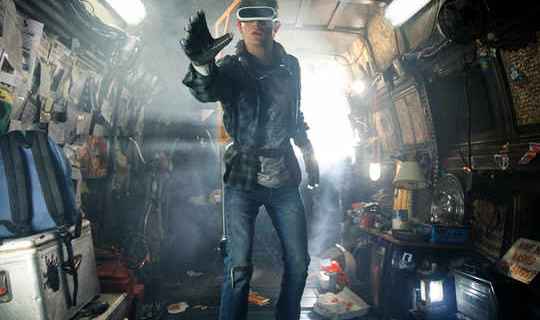
Although the content of Ready Player One subverts the characters under Wade, the usage of video game conventions in the novel also contributes to the supremacy of the main character over all other considerations.
As Parzival, Art3mis, and Aech are about to enter the Final Gate of the hunt, IOI activates the Catalyst, an item which wipes out everyone in the sector. However, Parzival possesses an extra life he won for playing a perfect game of Pacman and thus is the only avatar alive to complete the challenge before more IOI avatars arrive.
The protagonist being the only one able to complete a challenge is a convention frequently used in video games, variations of this including where the protagonist is singled out to fight a boss alone or is shown to kill the final boss in a cutscene even if another character kills them in the actual gameplay. However, the fact that Parzival is the only one able to try the last leg of the hunt besides IOI subverts the message the book was previously trying to send, that teamwork and a communal mindset are what will save the OASIS. In fact, Parzival is the only player to find a clue regarding the Third Gate of the hunt that states,
“The first was ringed in red metal
The second, in green stone
The third is clearest crystal
and cannot be unlocked alone.” (263)
The contest insists upon cooperation, later revealing that three avatars must open the gate, but the plot of the book immediately kills all but one player who try to complete the final task. In this way, Ready Player One can outwardly construct a progressive plot line about equality lead by a humble protagonist, but still offer the most power to Wade.
Ready Player One and Borderlands: The Superior Protagonist
After they have died, Shoto, Aech, and Art3mis serve as Parzival’s talking head companions in the final challenges of the hunt via being patched into his audio and video feeds, until he reaches the room containing Halliday’s Easter Egg. Companions assisting the protagonist through radio-like communication is another format frequently used in video games, for example in Borderlands and Borderlands 2. In the screenshot below from Borderlands 2, Roland, a protagonist in the original Borderlands, orders the protagonist to retreat but the player is supposed to ignore him. Furthermore, the protagonist is fighting Wilhelm, an enemy which previously defeated Roland and his friends, and by defeating Wilhelm the player by extension proves themself superior to Roland. Similarly, in Parzival’s challenges, he is ultimately free to ignore his friends while he beats challenges they do not have access to because he obtained an extra life no one else has.
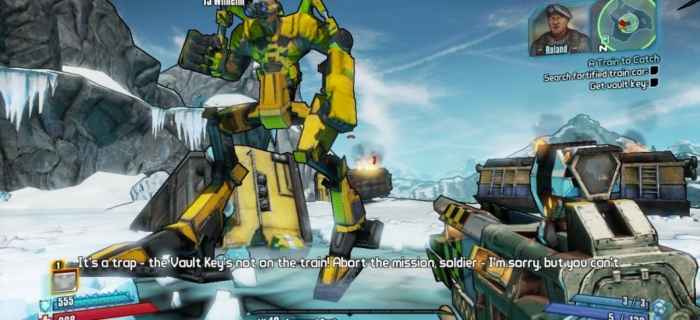
The fact that the remaining members of the High Five are not even able to see the very last challenge where Parzival locates the Easter egg further cements their diminished power in the narrative. Parzival has all the power and, although he shares his winnings, he is presented as the only hero capable of saving the OASIS.
A Vision of a Better Gamer Culture – But Only a Vision
What Ready Player One offers is essentially what video games have always offered to the white male heterosexual audience in the West, validation that they are superior or will at least be treated as superior. The equal relationship that Wade develops with the High Five is ultimately undermined by the plot or implicitly by Wade himself.
Thus, Ready Player One does not fulfill its full potential as a progressive narrative because of the regressive elements of gaming culture; however, it does offer visions of how the online community can become a more constructive space, players bonding through their mutual interests while embracing the difference of those they play with.
Works Cited
Cline, Ernest. Ready Player One. Broadway Paperbacks, 2011.
Burch, Anthony, writer. Borderlands 2. Gearbox, 2012. PS3.
What do you think? Leave a comment.











Ah great book, much nostalgia there. Cant’ wait for the adaptation. But I fear another kid-vs-corporation wafer thin plot with gorgeous exciting graphics to distract….. all of which is there in the book (where the FX budget is infinite). It’s the weight of 80s cultural references which are the most entertaining part, I hope they get that right.
What’s truly incredible about ‘Ready Player One’ is the spin Mr. Cline puts on VR education and the schools of the future! Absolutely, totally amazing, and absolutely doable, just as soon as our VR technology becomes affordable and really works. We’re getting there, albeit slowly, and that’s truly a step in the right direction.
The most exciting part the novel is his take on how VR will make a top-quality education available to anyone in the world who wants one, available online, instantly and in a tightly controlled environment that promotes real learning at its’ best, and at the same time, instantly eliminating all the negative elements that kids in our inner schools have to go thru today. Real online schools, with real online great teachers!
We can’t get there soon enough!
Ready Player One is a good dose of nostalgia, but it has not taken over our culture. There is escapism for sure (like building Westeros in Minecraft), but I see a good deal of original culture around me to worry. Both are needed and healthy.
As a fan of the book, I approve this analysis.
I really wasn’t a fan of Ready Player One. Thought I’d love it but the story was fairly predictable and it just disappointed me. Hopefully the film will make a better impact.
I liked the world building – Some nice ideas in there but the whole thing tailed off towards the end for me.
Not just trying to have an unpopular opinion here but I really didn’t think the book was that great. As someone born in 89 I got the majority of references, but the times that he rambled on for paragraphs and paragraphs making 80’s references made me grow tired of the book really fast. It felt like unnecessary exposition, just a bunch of information that is truly irrelevant to the characters and plot of the story. The references that foreshadow future events? Sure. Even more references to flesh out the 80’s vibe that he’s trying to make? Of course. Cline goes way beyond that though and it gets really old.
I totally understand that, and I’m surprised anyone younger than 40 loves the book. I was born in 1974 and grew up dropping precious quarters in Pac-Mac and Joust, playing my 2600, watching MTV, and memorizing Holy Grail & WarGames. I already knew much of the obscure trivia discussed, but never imagined it was useful. Clive wrote a book where people like me can save the world. I find it stupidly gratifying, and it’s one of my all time favorites.
Being born in ‘72 I think I got all the references instantly (except the Spiderman anime robot – had to google that dumb thing) too. Like you said, I enjoyed the book, but I can’t say it was good, in fact I have no idea why anyone would like it if they didn’t grow up a geek in the 80s. The book really suffered from the “show don’t tell” problem.
SPOILERS
We go to the Tomb of Horrors – I have horrid memories of losing characters in the module, I can still picture those illustrations clearly in my memory. If you didn’t play it, did you really experience it in the book? Once the tomb was found it was almost like “he carefully avoid the traps and got to the end”. Wow, thanks!
Even more so for Zork, “He easily solved the game from memory” (or did he use the invisiclues?).
Also, you’re telling my this kid was a damn Pac Man, Joust, and Tempest master? With the sum total of all 80s games to experience, you played this one game enough that you can make it to the split screen of pac man on like one quarter.*
I just came to say that if you haven’t read this book.. You should, you are missing out.
The audiobook narrated by Will Wheaton is even better.
It’s Cline’s work. It’s only his. What he did with it was his choice. Did you like it? Doesn’t matter if you did or didn’t. If you did. Great. Didn’t? Great. It’s his work. Just because he decided to use things that personally interested him to fill up the world in which he created – it’s subjective if that makes it suck. But, it’s fiction. It’s one man’s vision for just his book. It’s not a big deal. He’s not writing the future. He’s just writing a book. It can’t be the things we expect from the setting. We’re just readers or viewers in the case of this book or of Star Wars. It’s entirely subjective on us.
Loved this book and loved that it was narrated by Will Wheaton! I liked it, sure its a bit contrived and predictable but i still enjoyed it.
Started and finished the book today, thanks for encouraging me…Absolutely positively fan-freakin-tastic. Really didn’t mean to finish it all in one sitting but that’s exactly what I did. I felt like I was a kid again staying up way passed my bedtime, huddled under the blankets, flashlight clutched between my chin and shoulder, just so I could finish whatever book was obsessing me at the time.
Throughout the book, you get the feeling a billionaire just destroyed a generation’s notion of originality and will to create their own culture just because he wanted people to love the 80s again. It isn’t the book’s only worrying flaw (I have trouble with the spoilery reveal of the real life identity of one of the secondary characters), but it is its most pervasive.
I rather enjoyed Ready Player One, an absolute pean to 80s pop culture and gaming. However, even with Spielberg at the helm, it seems a tricky book to translate into film. Depicting Wade ‘ s role – playing through War Games and Monty Python ‘ s Holy Grail seems like a nightmare to do, to me. Could go either way.
Edgar Wright would be a better fit perhaps. Not sure Spielberg is that much of a gaming geek to get it right.
One of the worst books I’ve read in the last few years. I’m all for pop culture referenced and meta commentary when it is in service to the plot and the characters, but this just seemed like an attempt to shoehorn as many 80s references as possible into a barely passable plot.
The film can’t be any worse than the book was.
I think you missed the point-the creator of the Oasis was obsessed with the 80s and early video games culture.
Lots of pop culture references here.
I liked the idea of this book but I thought it was fairly badly written, and the main character wasn’t very likeable.
Cline ruined my productivity for the last two days. I will not hesitate to recommend this book to literally everyone I ever meet. I am so jealous for the generation that grew up in the 80s – because there are things in the book I’ll never get.
I think this essay falls apart on its central thesis as Ready Player One isn’t attempting to push a progressive narrative. Maybe you could argue that it’s trying at the pretense of one, but the book is first and always about the validation of the protagonist as a stand-in for the reader. (I know a few people who have called the book “American Sword Art Online” and I find it’s a pretty apt comparison.)
I also strongly disagree with the statement that games are designed for “validation” — that wasn’t the case until the rise of social media/mobile as a gaming platform and to a lesser extent the increased visibility of identity politics in the mainstream media, and even then it’s only some companies that design games with validation first (via loot boxes and energy recharge items and various pay-to-win methods). The majority of the games that are in the “core” gaming market, those that are the most likely to be played by people who self-identify as “geeks” or “gamers” are primarily designed with gameplay or narrative as the primary objective.
And regarding gaming validating straight white men — yes, the main demographic in Western gaming are young men, but they aren’t the ONLY demographic, and to posit that as fact erases the gaming fans who aren’t white/male/straight/all of the above and ignores their reasons for cultivating video games as a hobby.
I truly cannot wait to read this book.
This book was such a waste of time. I just finished the audiobook (which was horribly narrated) and couldn’t feel anything but relief at the fact that the cringy poser-neckbeard fanfiction was concluded. The allusions were ancient and irrelevant, the characters empty and boring, and the plot was about as deep as a puddle on concrete. Such a waste of time.
One of the most enjoyable books I’ve ever read. It was so bloody visual I feel like I’ve watched the movie already.
No pressure.
One of the most entertaining books I’ve ever read!
It’s important to recognize that although a text might outwardly promote something, it can still contradict itself through actions. This is a good lesson and point.
The book was like a cgi laden film it was all style no substance. Barely any char development, no tension, there was not a single point that I thought the “baddies” had the upper hand because our hero would just find or do the right thing in the moment. It was weak writing dressed up in reader nostalgia to attract likes.
I think there’s also another, perhaps more foundational way in which Ready Player One is incredibly regressive, namely that it’s fundamentally about fetishising and meticulously replicating, rather than creatively interacting with, enriching and expanding existing narrative universes, tropes, styles or archetypes. As such, it tends towards reinforcing and replicating the power structures that underlie these existing narratives and their creation, consumption and interpretation. As I’ve seen it put by another poster, Ready Player One is “proudly, aggressively, and oppressively non-transformative” (http://ponyregrets.tumblr.com/post/169560632539/okay-friends-as-ready-player-one-comes-into-the).
Welp. I thought I might enjoy reading the book but this article just pointed out why I might be disappointed in it.
Dodged the bullet.